EcoFlow
EcoFlow 100W Flexible Solar Panel
EcoFlow 100W Flexible Solar Panel
Couldn't load pickup availability
EcoFlow 100W Flexible Solar Panel
100W Flexible Solar Panels

This Panel Weight only 5.1 lbs and Fits Multiple Curve
Light & Flexible, More Than Ever

Coated With Advanced Glass Fiber
Durable For Your Solar Power

Made From Highly Efficient Monocrystalline Cells
Charge Faster With High Solar Conversion

IP68* Waterproof Rating
Built To Weather The Storm
Our 100W flexible solar panel can capture solar energy through even the heaviest rain. With a protective ETFE film, the panel’s solar cells can withstand many environments, from humid to dry.
*Water and dust resistance were tested under controlled laboratory conditions with a rating of IP68 under IEC standard 60529 (maximum water depth of 1 meter for up to 72 hours.)

Use the Pre-Cut Eyelets to Fit Our Panels as You Wish
Chose Your Way To Install At Ease

Solar Cable for Universal Compatibility
Add Up To Your Solar and Power Systems

What's in the box?

Tech Specs
100W Flexible Panel
| Solar Panel Weight | Approx.2.3 kg (5.1lbs) |
| Dimensions | 1055*612*25 mm (41.5*24.1*1.0 in) |
| Rated Power | 100 W(+/-5W) |
| Open Circuit Voltage | 20.3 V |
| Short Circuit Current | 6.3 A |
| Maximum Operating Voltage |
17.1 V |
| Maximum Operating Current | 5.9 A |
| Temperature Coefficient of Rated Power | -0.39%/°C |
| Temperature Coefficient of Open Circuit Voltage | -0.33%/°C |
| Temperature Coefficient of Short Circuit Current | 0.06%/°C |
| Maximum System Voltage | 600 VDC(UL) |
| Maximum Fuse Current | 15 A |

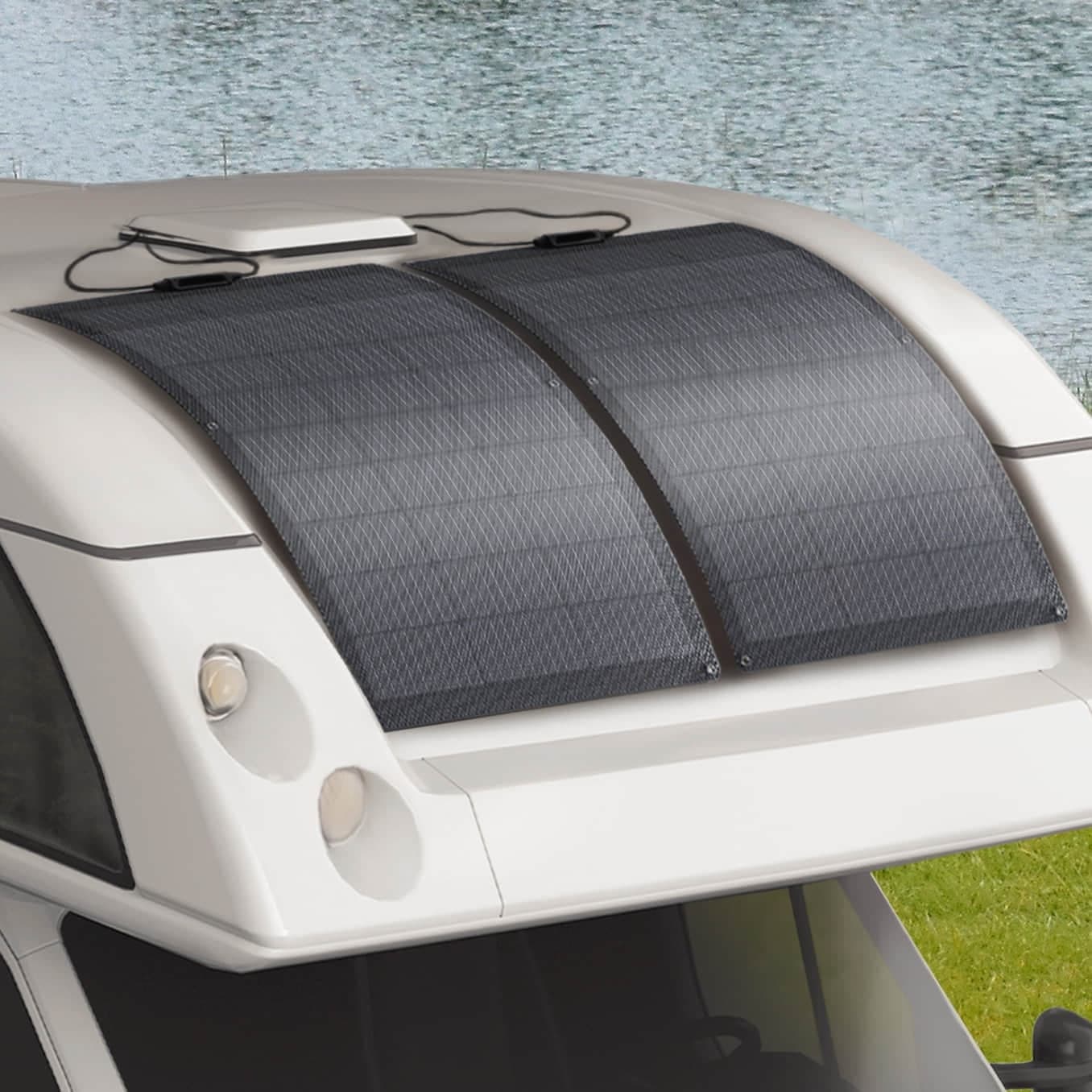
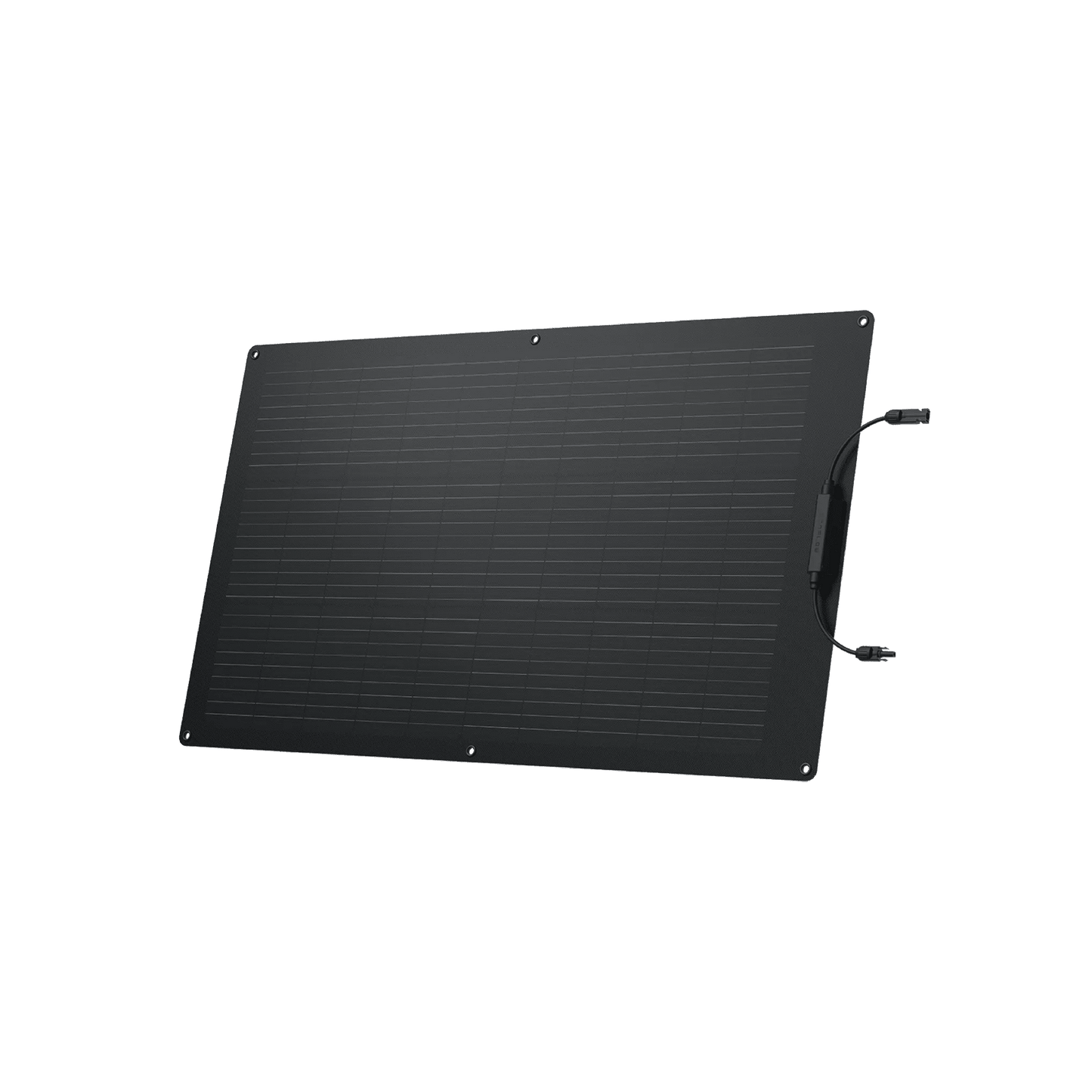
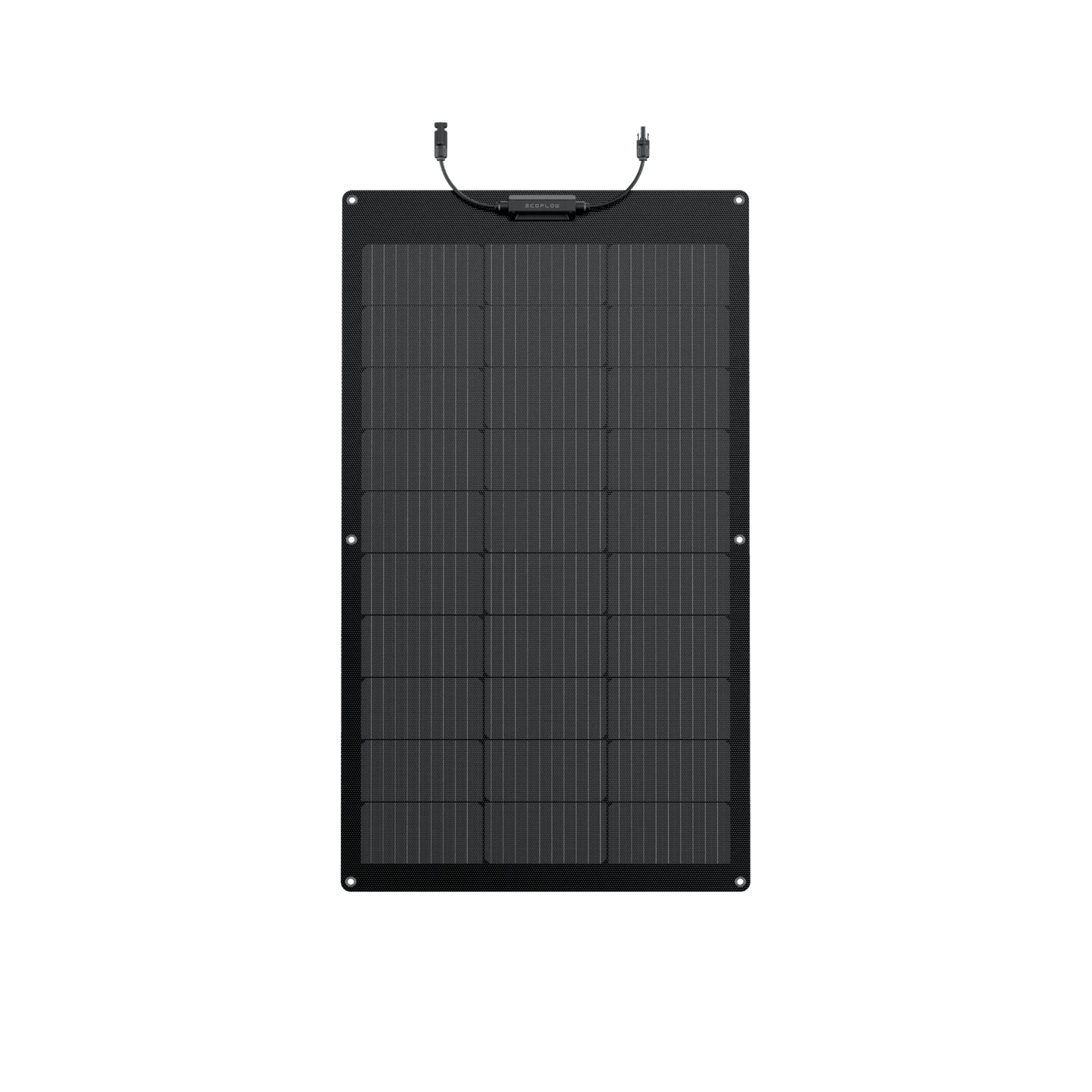
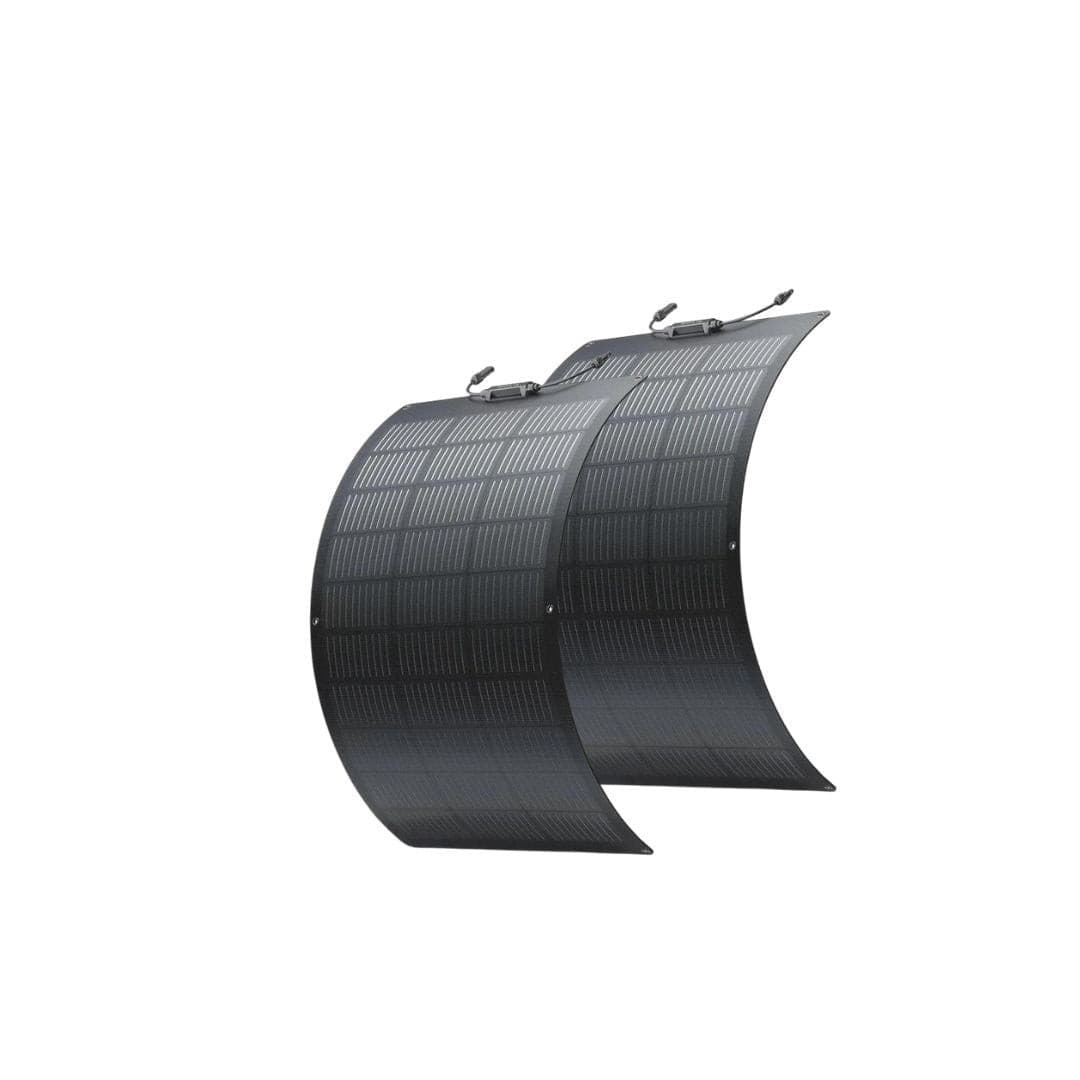
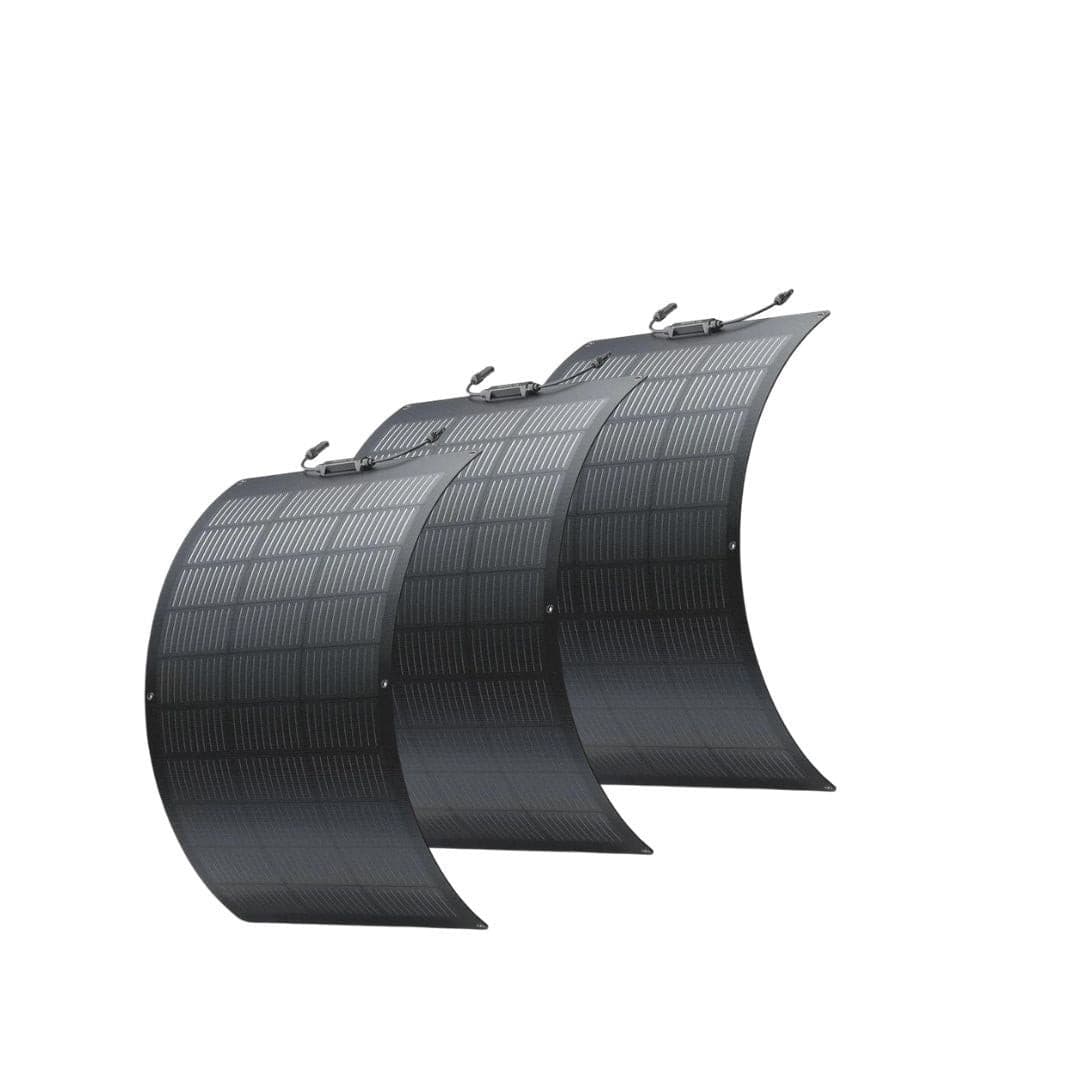
EcoFlow Solar Panel Comparison
Original vs. NextGen
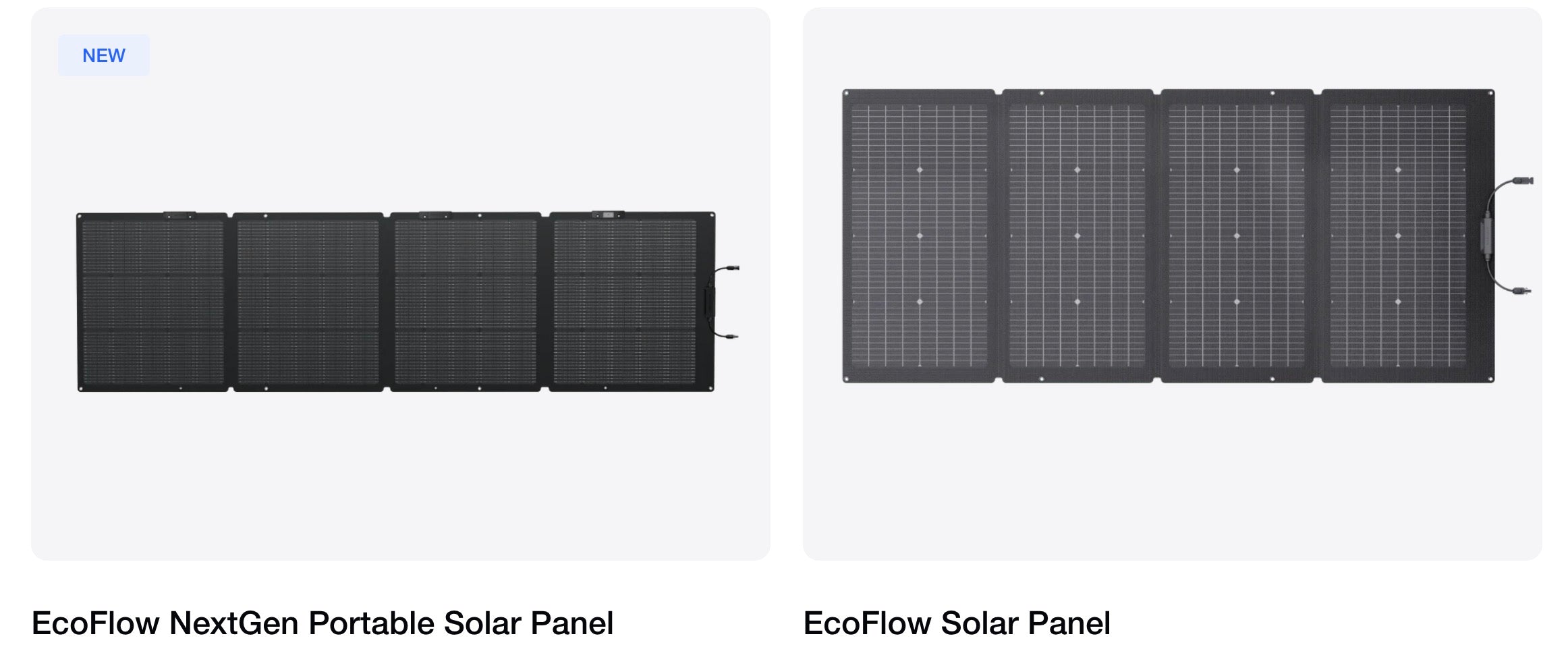
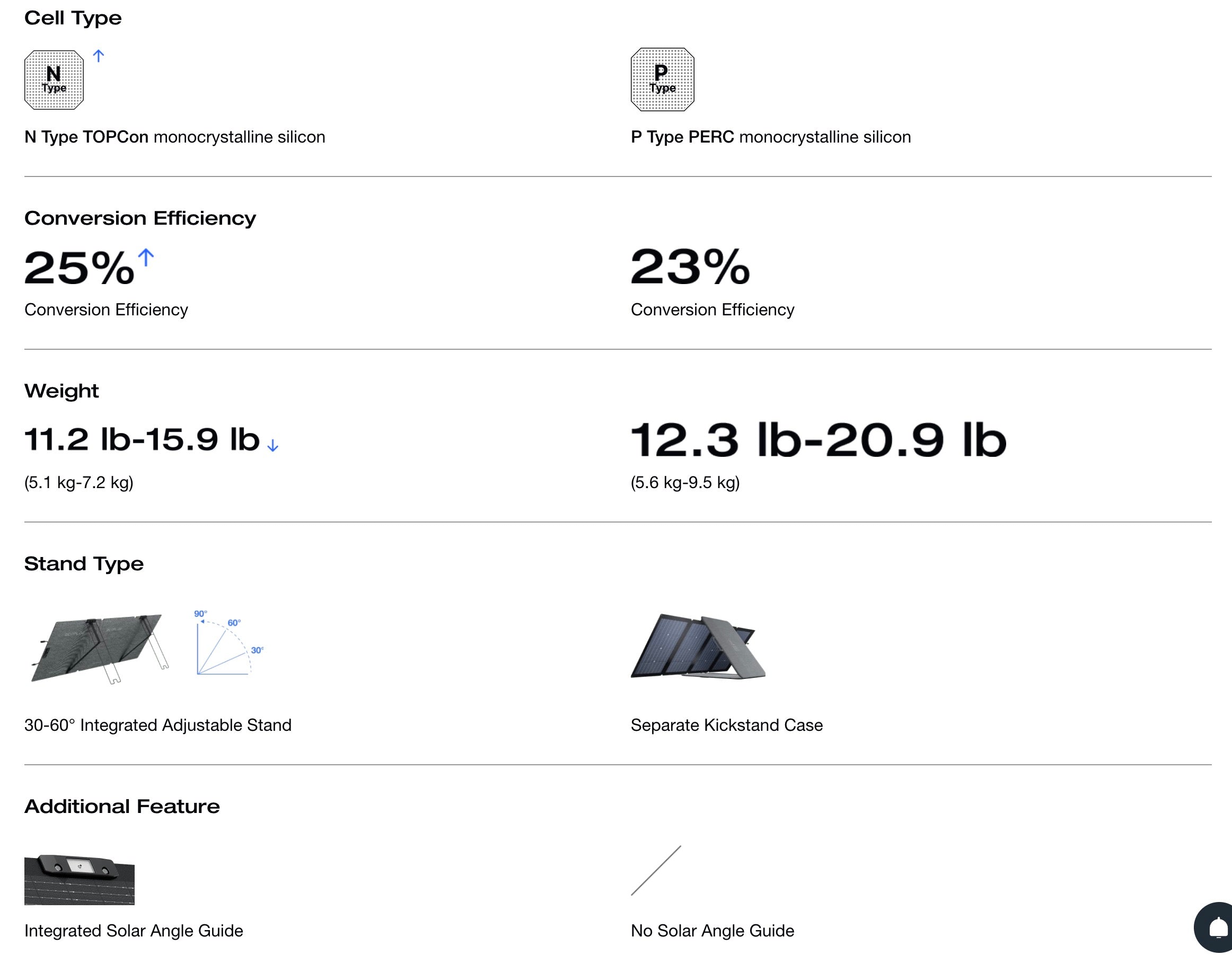


The Revolutionary EcoFlow Power Solution
FAQ
How do I get the most solar power?
Increase the efficiency of your solar panel by facing it directly at the sun without any obstructions. Remember to be careful when handling your solar panel because damaged cells provide less power.
Does it charge if it's inside?
Yes, if the only thing between it and the sun is transparent, but it won’t charge as well compared to being outside. You can compare the difference by looking at the input section of your power station’s LCD screen.
Can I use solar panels of different specifications for mixed use?
Yes, but it is not recommended. Different energy storage controllers have requirements and restrictions on the output of solar panels. When solar panels with different current values are used in series, they will be limited, resulting in the inability to release the output power and even the short-board effect of 1+1<2
What features and advantages does EcoFlow TOPcon solar panel have compared to other solar panels?
EcoFlow TOPcon solar panel has a next-level solar conversion efficiency rate of 25%, significantly higher than the 18%-20% conversion efficiency of many traditional solar panels. It maintains high power output even in low light and high-temperature environments, making it perform better in various weather conditions. It has an IP68 waterproof rating, ensuring greater durability and reliability, with a lifespan of up to 30 years.
What is the power range that a 175W solar panel can typically achieve?
On a sunny day without clouds and direct sunlight, the power range of a 175W solar panel is between 130–145W (this data is obtained under the conditions of irradiance of 800–900W/m2 and the panel surface at 60°C (140°F)). The nominal data of the solar panel is obtained by testing under the conditions of AM1.5, meteorological conditions of 1000W/m2, and panel surface temperature of 25°C (77°F). A power close to the nominal value can usually be reached at midday on a sunny day in winter.
Do I need to clean the 175 W Solar Panel regularly?
Yes. There can be a lot of dust and foreign objects on the surface of the solar panel after the panel has been used outdoors for a long time, which block the light to a certain extent, reducing the power output. Regular cleaning can help keep the surface of the solar panel clean and free from obstructions and generate a higher power output.However, when cleaning, be careful to wipe the surface with soft materials to prevent hard materials scratching the surface of the panel and affecting the output.
What types of vehicles is this solar panel suitable for?
It is suitable for installation on the roofs of Class B Vans, Class C vehicles, and trailers.
Do solar panels need extra controllers or inverters?
You should choose the right controller or inverter based on your specific usage to ensure efficient storage and use of electricity.
How do you connect this solar panel?
This solar panel features a high-voltage design and uses an LFB-40 interface. It can be connected in series to save on wiring.
What is the LFB-40 interface?
The LFB-40 interface is a common DC power output connector used for solar panels. It primarily facilitates power transmission between portable solar power generation equipment and devices like charging controllers, energy storage units, and power banks.
What are the features of the LFB-40 interface?
This interface supports a maximum current of 40A, meeting the standard 30A current capacity. It can reliably handle high currents, preventing overheating or damage. It can be connected in series, allowing up to 10 130W solar panels to be linked together. Additionally, it has a locking mechanism to ensure the solar panel remains secure and does not detach due to vibrations when installed on a vehicle.
How should solar panels be cleaned and maintained?
Regularly clean the panels with clean water or a damp cloth to prevent dust from reducing their efficiency. Avoid using hard objects to scratch the surface to prevent damage. Annually check the wire connections to make sure they are secure, as poor connections can affect charging.
Can solar panels generate electricity on cloudy days or at night?
Solar panels require sunlight to generate electricity. They can still produce a small amount of power on cloudy days, but with reduced efficiency. At night or in extreme weather conditions, their power generation capacity will significantly decrease or stop, so using energy storage equipment is recommended.
Can solar panels generate electricity during winter?
Yes, but their efficiency will be lower. Winter has shorter daylight hours, and low temperatures can affect the performance of the batteries. It is advisable to regularly check if the solar panels are covered by snow during winter to maintain good power generation capacity.
Can solar panels handle high temperatures?
Typically, they can endure temperatures ranging from -40°C to 85°C, though extended exposure to high heat might reduce their efficiency.
Will adding solar panels make a vehicle heavier?
Solar panels are quite light, with each panel weighing around 5.6 kg, so they generally don't add much weight to the vehicle.
FAQ-EcoFlow HeatGuard Solar Film
Warranty & Return Disclaimer
- Due to the product’s specialized structural design, returns or exchanges are not accepted for issues unrelated to product quality or those resulting from failure to follow the installation instructions.
- Damage caused by force majeure events (e.g., hail, hurricane, fires, or other natural disasters) is not covered under warranty.
If the solar panel(s) are installed on a vehicle, will they blow off at high speeds?
First, make sure to follow the installation instructions correctly. We use 3M VHB tape, a very strong double-sided tape designed for high-strength bonding. Even at high speeds, where the roof faces significant wind pressure, the VHB tape's strong adhesive power ensures that the EcoFlow HeatGuard Solar Film stays firmly attached to the roof. This tape is also designed to handle different temperature changes and the dynamic pressure from vehicle speed, so under normal conditions, the solar panel won't come off due to high speed.
If I have already installed the product, and there is no quality issue, is it still possible to return it?
Products that have been installed and have no quality issues cannot be returned or exchanged. Please thoroughly inspect the product and confirm your requirements before installation. If issues arise due to special structural designs or not following the manual, returns and exchanges will not be possible after installation. Additionally, do not use the product in extreme weather conditions like hail or typhoons, as any damage caused will not be covered under the warranty. If you have any questions, please contact customer service, and we will be happy to assist you.
Will the solar panel installed on the roof get water inside of it?
All of our products support IP68 waterproof capability, which can handle various water immersion scenarios, cleaning, dust, and other factors, so you can use them with confidence.
Can the solar panel withstand extreme weather? What if it gets damaged by hail?
This solar panel is waterproof, dustproof, and UV-resistant, and can withstand high temperatures, low temperatures, rain, and snow. However, damage caused by using this product in harsh or extreme weather conditions (such as hail or typhoons) is not covered under warranty.
Will installing EcoFlow HeatGuard Solar Film increase the vehicle's weight?
EcoFlow HeatGuard Solar Film is lightweight and usually does not significantly increase the vehicle's load.
Can solar panels still generate electricity in the winter?
Yes, but their efficiency will decrease. Winter has shorter daylight hours, and low temperatures may affect battery charging and discharging performance. It is recommended to regularly check whether the solar panels are covered with snow in winter to maintain good power generation capability.
Can solar panels work at night?
Solar panels require sunlight to generate electricity. They can still produce a small amount of power on cloudy days, but with reduced efficiency. At night or in extreme weather conditions, their power generation capacity will significantly decrease or stop, so using energy storage equipment is recommended.
Can solar panels generate electricity during winter?
Yes, but their efficiency will be lower. Winter has shorter daylight hours, and low temperatures can affect the performance of the batteries. It is advisable to regularly check if the solar panels are covered by snow during winter to maintain good power generation capacity.
Can solar panels handle high temperatures?
Typically, they can endure temperatures ranging from -40°C to 85°C, though extended exposure to high heat might reduce their efficiency.
Will adding solar panels make a vehicle heavier?
Solar panels are quite light, with each panel weighing around 5.6 kg, so they generally don't add much weight to the vehicle.







